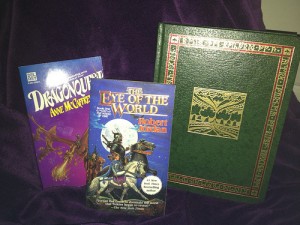
Foundational texts for life, or the literary genre that dare not speak its name? The camera flash on Dragonquest is unwittingly symbolic of the book’s impact on my fifth-grade self. Credit: nerdybookclub.wordpress.com
This year I’ve made it halfway through two novels by esteemed literary authors that both manage to make Japanese death cults holed up in mountain fastnesses a central aspect of their plots. The Thousand Autumns of Jacob de Zoet, by David Mitchell (Cloud Atlas dude), and 1Q84 by Haruki Murakami, whose work I know mostly from stories in the New Yorker. How I stopped reading 1Q84 was actually kind of funny…my Minuteman Library e-book loan expired and it up and vanished from my Kindle. Modern times! With 1K Autumns I just sort of lost the ganas to keep going.
[SPOILER ALERT FOR LATE-ARRIVING LITERATURE FANS:] In 1K Autumns, the death cult in the mountains is devoted to hooking up the priests with unsuspecting women–shipped up the mountain by their families under the auspices of the regional priest-lord–to give birth to babies who are then sacrificed to fulfill some hideous BS religious injunction, but whose deaths are masked by a very long-term campaign of writing false letters home by the children as they supposedly grow up happily elsewhere. In 1Q84, the death cult is more directly allusive to Aum Shinrikyo as well as good ‘ol Oceania of Orwell’s 1984, with a super-power-having “Leader” figure who was just getting into the good stuff when my loan ran out and the bits of literature were slurped back into the ether.
Without getting into the depths of my ignorance about Japanese history or literature, I was struck by two globe-bestriding writer dudes happening to end up with this shared plot element in novels appearing more or less simultaneously. Both authors’ approaches to (postmodern) fiction invest the death cults with realistic, horrifying aspects, while at the same time stirring them into the general mix of plot, language and character that evoke broader questions about the nature of narrative, how that relates to society, etc. But you could do that with comic books or baseball too…why death cults? Why Japan?
Backing up a bit, Amy is running her women’s gathering tonight on the topic of favorite books. This morning she was asking me about the books that have had the biggest impact on my life, on how I think, that I have most enjoyed. And maybe because I knew she was putting the list together for a group that I (perhaps unjustly) don’t imagine has much truck with scifi/fantasy, I neglected to mention that, in fact, the books I have most enjoyed this past year include a gorge-a-thon of the entire Song of Ice and Fire series, my sixth reading of China Miéville’s The Scar, and Stephenson’s Reamde (though it might not crack my top five of his works). And at the same time, I found myself stopping Richard Ford’s Canada about 2/3 through, though I think he is one of the world’s best writers and he has answered two different fan letters from me.
Do other people who have pretensions of or careers in literature also feel this same shyness about acknowledging one’s genre-lovin’ “base” self alongside one’s “higher” literary interests? Of late there are some examples of serious literary authors (Michael Chabon, and of course Junot Diaz, who makes amazing use of Tolkein and general D&D-style lore in Oscar Wao) refusing to divide themselves entirely as fans or writers between LITratoore and scifi. But these guys can do whatever they want…it is something else, maybe, for a private citizen to have one’s best books of the year lists be dominated by fantasy.

Having a career in literature (if literary translator counts), I hereby shyly confess that I am in the middle of a gorge-a-thon of sf/fantasy novels by Jack Vance, including all the ones I didn’t read when I was fifteen. For some reason, however, this nostalgic reawakening of my genre-loving younger base self only extends to Jack Vance: I have tried re-reading Tolkein, but found LOTR turgid and tedious beyond belief almost thirty years on. Likewise, Michael Moorcock (Elric etc.) seems utter tosh to me now. As for Jack Vance, there was an article in the New York Times not long ago, with the title “The Genre Artist”, which argues that he is a great writer doomed to obscurity outside his particular genre precisely because he writes in that genre. Anyway, I highly recommend his Cugel’s Saga and Rhialto the Marvellous, which would feature on my list of books I have most enjoyed this year, alongside Moby Dick (which I am ashamed to say I had never read before), Austerlitz (W.G. Sebald), Dead Souls (fourth re-read), and De Inferis rebusque post mortem futuris ex hebraeorum et graecorum opinionibus (Friedrich Boettcher).
Blyth I think even rounding “down” for Jack Vance your reading list is exemplary in its literary merits. I know I’ve had to cut down on my Latin reading lately…
I forgot to mention that death cults with monastery-style headquarters in mountain fastnesses also feature in a number of Vance novels.